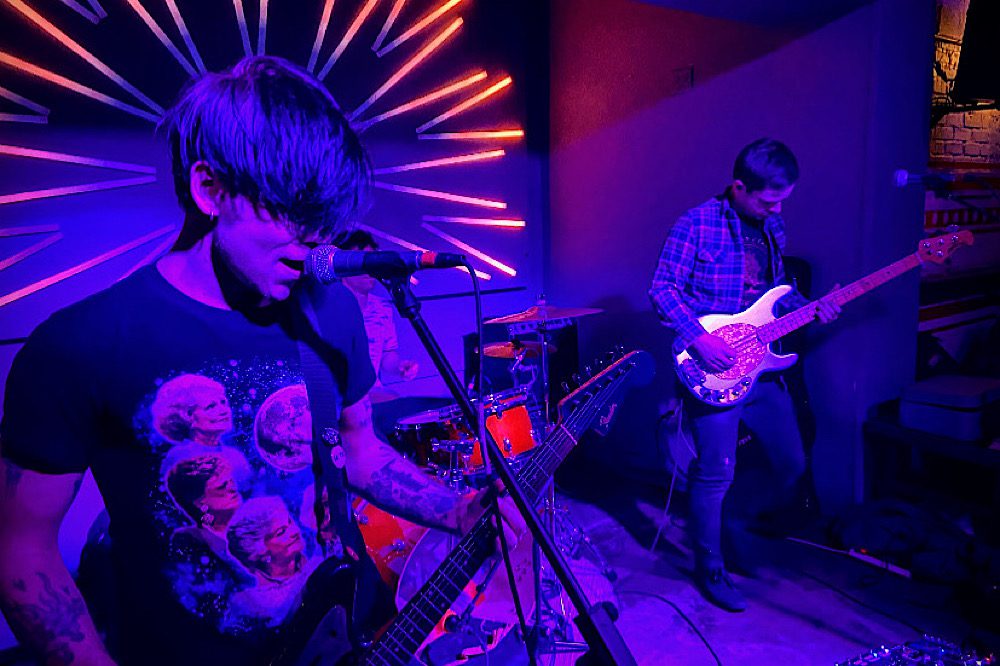

Mike Borchardt, frontman of Brooklyn DIY punk outfit Nihiloceros, is a stellar show-goer. He is always stage-side, taking photos and promoting every show happening that week on his band’s social media accounts. From the looks of Instagram, he has taken the transition from IRL gigs to virtual shows in stride, continuing to post live stream schedules and Insta-live screen shots.
Mike started what has become Brooklyn’s most supportive band in his hometown of Chicago. They were originally called Samantha, but changed their name to the much more Google-able Nihiloceros. The trash pop trio’s rhythm section is filled out by Alex Hoffman on bass and vocals, and German Sent on drums. They released a self-titled EP in 2017, and are putting the finishing touches on their follow-up EP in a socially distant manner. You can catch Mike of Nihiloceros doing a solo set this Tuesday, June 2nd on Radio Free Brooklyn’s Instagram at 8pm. We chatted with Mike about commuting during lock down, creative livestreaming, and being quarantined with band mates.
AF: Has Nihiloceros been able to get together or collaborate remotely during lockdown?
MB:Luckily Alex lives right downstairs so he and I have been able to work on music a bit. We’ve built a little recording booth in the basement for a few finishing touches on the new Nihiloceros record. I’m still taking the subway into Manhattan every day for work, and Alex’s wife is pregnant, so we’ve been trying to socially distance the “upstairs people” from the “downstairs people” as much as possible. I’m definitely the black sheep pariah of Nihiloceros Castle.
German has been quarantined with his family in New Jersey. I haven’t seen him since our last show the first week of March, but we’ve been talking through musical concepts we are excited to start exploring. German drove back into Brooklyn a couple times to go play drums in isolation at our rehearsal space. Alex and German are both in the middle of home construction projects, so they’ve also been swapping notes on demolition and rehab. German and I have been workshopping prototypes for new merch, including Nihiloceros soap and Nihiloceros Chia Pets.
AF: What are some of the things you’ve done to support bands and venues in lieu of not being able to go to shows?
MB: It’s been really important to us to stay involved with the scene as we all navigate this crisis together. I’ve written a handful of songs for some quarantine compilations (Dim Things, Shred City, NYC Musicians for NYC) all to raise money for Artist Relief Tree, Food Bank for NYC, etc. We’ve done a series of video sessions and livestreams for a lot of the venues like Our Wicked Lady and The Footlight to help them pay their staff and hopefully keep their doors open on the other side of this. Everyone should check out the work NIVA [National Independent Venue Association] is doing through #SaveOurStages to drum up congressional support and secure funding on a national scale for all these stages that make up our DIY tour circuits.
Alex and I are both lucky to still be working, so we’ve been buying merch and music from bands as much as possible. And also obviously we’ve been catching and sharing as many artists’ livestreams as possible. From a photography standpoint, those screenshots on the phone aren’t as fun, but they’re much easier to edit.
AF: Do you have any creative tips on screen shooting live streams? What’s your approach to live streaming like?
MB: I think we are all still trying to figure that out. I remember the first week of the lockdown, we played a couple shows on the Left Bank Magazine Virtual Music Fest, and we all spent a lot of time looking to see if we had hit the right button, if we were live, if people were watching, and asking viewers if everything sounded okay. In the weeks and months since, I think we started to figure things out. I believe Ilithios was the first I saw who just shut up and put on a great show. Since then, I’ve tried to make our livestreams be more like a real performance and less like my dad trying to use the internet.
We also always try and partner a livestream with an organization or label/blog/venue (BandsDoBK, Ms. Understood Records, Songwriters Salon, etc.) as a vehicle to raise money or awareness for something we care about. Gillian Visco (Shadow Monster) and I came up with a super fun weekly music hangout stream idea called #TagnSplit that’s been touring around the community for a few weeks now. We got some stuff we are working on with Bloodless Management, Street Wannabes, as well as some live podcasts in Staten Island and Philadelphia and St.Louis. And this Tuesday night 6/2, Nihiloceros is going live on Radio Free Brooklyn to play some songs and talk about ways we can all help out.
AF: You’re an essential worker and still commute to your job everyday. How has navigating the city been during this time and has the experience changed your perspective of New York City?
MB: Taking the subway into the city everyday amidst the pandemic has definitely been an experience I won’t soon forget. It’s been a constantly evolving situation that I’ve witnessed ranging from terrifying to extremely heartwarming. On one side there’s the Mad Max post-apocalyptic Manhattan streets and the homeless camp territory wars on the subways. But at the same time I see a heightened sense of care and humanity as we reach out and help one another, and as we take responsibility to safely share our limited social spaces. The other day, a stranger pulled over and got out of her car to give me her canvas bag and helped me gather my groceries that had fallen, broken eggs all over the sidewalk, and humus that rolled into the street. This pandemic has had a real polarizing effect, but it has reaffirmed my perspective of NYC and everything that defines it. Everything great and everything awful about this city will still be here after this crisis is over. And that’s kind of comforting to me. Though hopefully we carry forward a little more of the good than we do the awful.
AF: What do you think life in NYC as a musician will be like post-lockdown?
MB: I think humans have a short memory and an amazing ability to adapt and pivot. That can be both a good and bad thing. We are extremely resilient, but we often don’t learn from missteps and end up repeating the same mistakes. I think our communities will make some adjustments as we ease back into our new normal. I don’t know exactly what that’s going to look like. It might be a little while before moshing, crowd-surfing, and hugs make a huge comeback. People are itching to get back out into our creative outlets and social circles, but we are also justifiably apprehensive. It will just take time.
I hope we learn to appreciate what matters a little more, both in and out of music. Maybe we won’t feel the need to scramble all over each other all the time. Maybe we can slow down and enjoy the process a little more. This has been a unique opportunity to reset who we are as artists and who we are as people. It’s an opportunity to rebuild the community the way we want it built. I really hope we continue to build each other up and come to appreciate the journey rather than the destination.
AF: Is Nihiloceros planning to release any new music in 2020?
MB: That’s the million dollar question right now, and I really don’t know the answer. Our new record was almost finished before the pandemic hit. Alex and I had been in the studio writing and recording and it with Chris Gilroy, who drummed with us on the record before German joined the band. We are super proud of it, and were already extremely eager to release it. But as a band that defines themselves so heavily on their live show, it just doesn’t feel right to put it out there without the ability to play and tour on it properly. We’ve had to push both our Summer and Fall 2020 tour plans, so we may hold off on releasing it until we have a better idea of what the future of live music looks like.
I’ve been losing a lot of sleep over this the past few months. We still have to get Stephanie Gunther (Desert Sharks) and Gillian Visco (Shadow Monster) into the studio to do some vocals on a couple songs once it’s safe. Maybe we’ll release a song later this year, and release two records in 2021 since we’ve already started writing new songs.
RSVP HERE for Mike of Nihiloceros livestream on Radio Free Brooklyn’s Instagram 8pm Tuesday 6/2.
More great livestreams this week…
5/29 Ana Becker (of Catty, Fruit&Flowers, Habibi) and Vanessa Silberman via The Foolight Instagram. 8pm est, RSVP HERE
5/29 Dropkick Murphys and Bruce Springsteen via Fenway Park Facebook. 6pm est, RSVP HERE
5/30 Johanna Warren and SAD13 via Baby.TV. 7pm est, $5-50, RSVP HERE
5/30 Psychic Twin (dance party) via Instagram. 1am est, RSVP HERE
5/31 Courtney Marie Andrews via Pickathon Presents YouTube. 4pm est, RSVP HERE
6/1 Brandi Carlile performing By The Way, I Forgive You via Veeps. 9pm est, RSVP HERE
6/1 Elvis Costello, Anne Hathaway and more via YouTube (Public Theatre Benefit). 7:15pm est, RSVP HERE
6/1 Waxahatchee via Noonchorus. 9pm est, RSVP HERE


